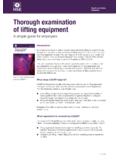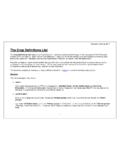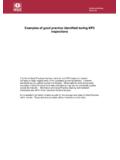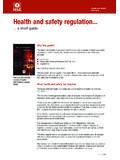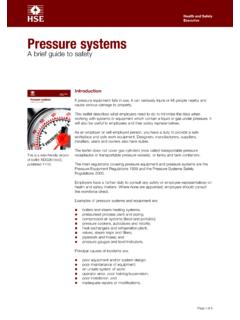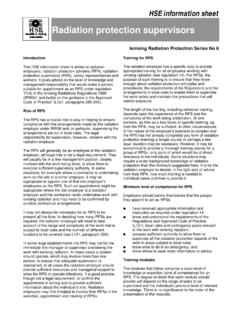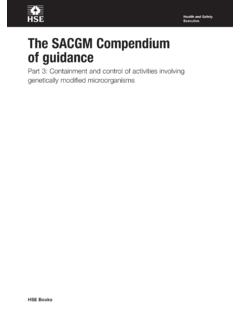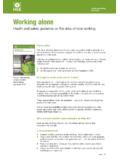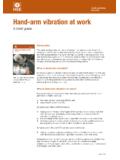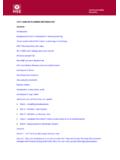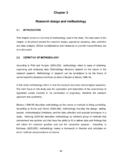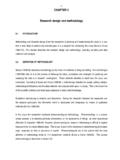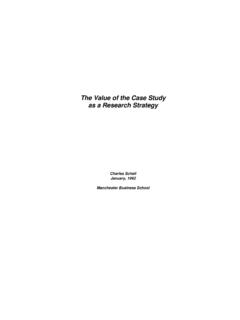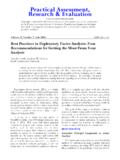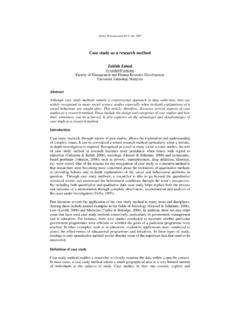Transcription of RESEARCH REPORT 169 - Health and Safety Executive
1 HSE. Health & Safety Executive Psychosocial risk factors in call centres: An evaluation of work design and well-being Prepared by theUniversity of Sheffield, Health and Safety Laboratory and UMIST. for the Health and Safety Executive 2003. RESEARCH REPORT 169. HSE. Health & Safety Executive Psychosocial risk factors in call centres: An evaluation of work design and well-being Christine A. Sprigg, BSc, MSc, , AFBPsS. University of Sheffield Firth Court Western Bank Sheffield South Yorkshire S10 2TN. Phoebe R. Smith, BSc, Health and Safety Laboratory Broad Lane Sheffield S3 7HQ.
2 Paul. R. Jackson, BA, MSc, PhD, , FBPsS. UMIST. Sackville St Manchester Lancashire M60 1QD. This RESEARCH REPORT (RR) is the third product from the Health and Safety Laboratory (HSL) Call Centre studies. The first product of the HSL RESEARCH was HELA Local Authority Circular (LAC 94/1). published in November 1999. The LAC reported the findings of HSL's exploratory and qualitative (interview and discussion-based) RESEARCH on call centres. The second product of HSL's call centre RESEARCH was a significantly revised and updated version of the HELA Local Authority Circular (LAC.)
3 94/1 (rev)), which was published in December 2001. In this RR, we REPORT findings from the larger scale quantitative (questionnaire-based) study. More specifically, this REPORT addresses four main questions: 1. Is working as a call handler more stressful than working in other jobs? 2. Is working as a call handler equally stressful for everyone who works as one? 3. What is it that makes working as a call handler stressful? 4. What can be done to reduce the psychosocial risks associated with working as a call handler? Future RESEARCH papers and articles in practitioner publications will REPORT further results and conclusions from this RESEARCH .
4 This REPORT and the work it describes were funded by the Health and Safety Executive (HSE). Its contents, including any opinions and/or conclusions expressed, are those of the authors alone and do not necessarily reflect HSE policy. HSE BOOKS. Crown copyright 2003. First published 2003. ISBN 0 7176 2774 8. All rights reserved. No part of this publication may be reproduced, stored in a retrieval system, or transmitted in any form or by any means (electronic, mechanical, photocopying, recording or otherwise) without the prior written permission of the copyright owner.
5 Applications for reproduction should be made in writing to: Licensing Division, Her Majesty's Stationery Office, St Clements House, 2-16 Colegate, Norwich NR3 1BQ or by e-mail to ii ACKNOWLEDGEMENTS. Johanna Beswick, Ceri Phelps, and Kath Travis for fieldwork and administrative support Nigel Hammond, formerly of the Local Authority Unit (LAU) HSE, for his support during our call centre RESEARCH . Trevor Shaw, Human Factors Unit, HSE, for facilitating the completion of this publication. All of the participating call centre organizations and their employees.
6 Iii iv CONTENTS 1 Introduction .. 1. Background .. 1. 1. RESEARCH literature on call 3. Study 1: Exploratory 5. Study 2: Main study .. 5. 2 Method .. 7. 7. The Questionnaire .. 7. 7. 3 Results .. 9. Sample characteristics .. 9. Question 1: Is working as a call handler more stressful than working in other jobs? .. 16. Question 2: Is working as a call handler equally stressful for everyone? .. 27. Question 3: What is it that makes working as a call handler stressful? .. 38. 4 Discussion .. 48. Summary of key findings to first three RESEARCH questions.
7 48. Question 4: What can be done to reduce the psychosocial risks associated with working as a call handler? .. 52. Overall Conclusions .. 54. Future 55. 5 References .. 57. 6 Appendices .. 62. Appendix 1: The Questionnaire .. 62. Appendix 2: Additional Risk 64. Appendix 3: Table of means, standard deviations and intercorrelations of job design measures and well-being measures for call handlers (n=825) .. 77. Appendix 4: Measures of Well-Being and Work 78. Appendix 5: Explanation of statistical terms .. 81. v vi Executive SUMMARY. This REPORT is the third product of the Health and Safety Laboratory (HSL) call centre studies.
8 The first product was HELA Local Authority Circular (LAC 94/1) published in November 1999. The LAC reported the findings of HSL's exploratory and qualitative (interview and discussion-based) RESEARCH on call centres. The second product was a significantly revised and updated version of that Circular (LAC 94/1 (rev)), published in December 2001. In this RESEARCH REPORT (RR) we present findings from the larger scale quantitative (questionnaire-based) study we conducted. This includes data from 36 call centres and 1,141. call centre employees. More specifically, this REPORT addresses four main questions: 1.
9 Is working as a call handler more stressful than working in other jobs? 2. Is working as a call handler equally stressful for everyone who works as one? 3. What is it that makes working as a call handler stressful? 4. What can be done to reduce the psychosocial risks associated with working as a call handler? The answer to question 1 is Yes'. Our data show the risk of mental Health problems is higher for call handlers and job-related well-being is lower compared to benchmark groups of employees in other occupations. This seems to be the result of working within a call centre in general, rather than the role of call handler specifically (since call handlers are not markedly different from other call centre staff groups).
10 However, satisfaction with the intrinsic aspects of the job (the nature of the job itself). is much lower for call handlers than for other benchmark occupational groups and for other work roles within the call centre. The answer to question 2 is No'. Call handlers who reported poorer well-being worked in the telecommunications and IT business sector; worked in the larger call centres (employing 50 and over); had permanent contracts; followed strict scripts; had their performance measured either constantly or rarely; and were less interested in staying in the call centre industry.
